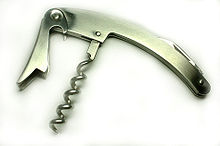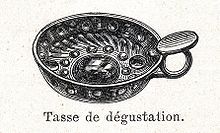Wine Sommelier
A sommelier or wine steward, is a trained and knowledgeable wine professional, commonly working in fine restaurants, who specializes in all aspects of wine service as well as wine and food matching. The role is more specialized and informed than that of a wine waiter.
Description
The principal work of a sommelier is in the areas of wine procurement, wine storage, wine cellar rotation, and expert service to wine customers.[1]
A sommelier may also be responsible for the development of wine lists,[1] and for the delivery of wine service and training for the other restaurant staff. Working along with the culinary team, they pair and suggest wines that will best complement each particular food menu item. This entails the necessity for a deep knowledge of how food and wine, beer, spirits and other beverages work in harmony. A professional sommelier also works on the floor of the restaurant and is in direct contact with restaurant patrons. The sommelier has a responsibility to work within the taste preference and budget parameters of the patron.
In modern times, a sommelier's role may be considered broader than working only with wines, and may encompass all aspects of the restaurant's service, with an enhanced focus on wines, beers, spirits, soft-drinks, cocktails, mineral waters, and tobaccos.
 |
 |
|
| The sommelier knife is an important tool of the sommelier. | The tastevin vessel associated with sommeliers in the past. |
Etymology
The modern word is French. It derives from Middle French where it referred to a court official charged with transportation of supplies.[2] This use of the term dates to a period when pack animals would be used to transport supplies. The Middle French probably finds its origin in Old Provencal where a saumalier was a pack animal driver.[2] Sauma referred to a pack animal or the load of a pack animal. In Late Latin, sagma referred to a packsaddle.[2]
Education and certification
Though sommelier is a job title potentially anyone may claim, becoming a certified sommelier requires classes and an examination.[3] The certification is offered by a wide range of educators, and a basic education may be attained for $800–3,750 over the course of six months.[3]
The Court of Master Sommeliers, established in 1977, is the examining body for the Master Sommelier Diploma, the Advanced Sommelier Certificate, the Certified Sommelier Certificate, and the Introductory Sommelier Certificate, and was created under the supervision of the Vintners Company, The Institute of Masters of Wine, The British Hotels & Restaurants Association, The Wine & Spirit Association of Great Britain and The Wholesale Tobacco Trade Association.[4] The Court also offers an intermediate level of Education titled "Advanced Sommelier Course" which invites carefully selected candidates to sit and be both tested and educated in the rigors of the Master Sommelier program. The course is generally offered 2-3 times per year and acceptance is highly controlled. Often candidates will apply for 3-4 years before being offered a position. The course is extreme in its preparation and testing for potential Masters Candidates. The Guild of Sommeliers is a nonprofit membership organization, created by a group of Master Sommeliers, to support the development of the trade.[citation needed]
In contrast to the British approach to wine education, the International Wine Guild, based out of Denver, is an accredited wine college that is approachable by those that are not only professionals in the Hospitality industry but wine enthusiasts as well. The Guild was founded in 1998 with a goal to provide wine education from entry through Master level diploma programs to those willing to dedicate themselves to develop the skills and knowledge base to be the best.The Guild offers over 25 different professional courses, which includes wine certifications for Certified Sommelier, Executive Sommelier, Guild Wine Master and Master Wine Educator. The Guild is the only entity to teach, train and provide certification for wine instructors and wine judges as well as provide Sake and Spirit Sommelier certifications. Guild programs are approved by the American Culinary Federation (ACF) for continuing education, as well as approved for the Department of Defense's MyCAA program and veterans benefits. All Guild programs are based on a curriculum taught by either Guild Wine Masters or a Master Candidates.
Currently Guild programs are being offered in Texas (Central Texas, Dallas & Houston), Denver, Washington, and China. Future cities include Los Angeles, Chicago, Seattle and New York City.
The International Wine Guild was named by both the Wall Street Journal and Wine & Food magazine as a top five wine school in the country for professional wine education.
Master Sommelier
Since the Master Sommelier Diploma was introduced in 1969, 171 people from around the world had become Master Sommeliers by 2009.[4] Of these there were 74 active Master Sommeliers in the Americas, 25 in Europe, with a female contingent of 12, all based in the U.S.[4] By 2008, the diploma had been awarded to 167 professionals world wide since its inception, 96 of these from North America, of which 15 were women.[5]
In France a few top catering schools offer a Sommelier's Diploma which is regarded as the basic for French Sommeliers.
The International Wine Guild's Master program consists of both Level III & IV courses. The following are the educational requirements to obtain a Level III certification: Guild Wine Master or Guild Master Cellar Manager (for the serious enthusiast).
* Completion of a Level II Certification program and the Senior Wine Instructor program. * Advanced Wine and Food Pairing Course. * Advanced Regional Series (France, Italy, New World) * Advanced Blind Tasting Course. * The Wine Business. * Level III Written, tasting and practical Exams.
The following are the educational requirements to obtain a Level IV certification: Guild Senior Wine Master. You must be in the wine and food industry to obtain this certification.
* Completion of a Level III Certification program and Competition Wine Judge program. * Fine Spirits (including a Fine Spirits Certification) * Wines of Europe (Germany, Spain, Portugal, Greece) * International Wine Markets and Management * History of Wine: Ancient World * History of Wine: Medieval World * History of Wine: Europe from 1500 to the Present * History of Wine: New World from 1500 to the Present * Advanced Fortified Wines * Level IV Written and Practical Exams.
Completion of the Level IV Diploma program and Certification allows you to be the prestigeous Master Wine Educator.
References
- winepros.com.au. The Oxford Companion to Wine. "sommelier". http://www.winepros.com.au/jsp/cda/reference/oxford_entry.jsp?entry_id=3001.
- "sommelier". The Merriam-Webster Dictionary. http://www.merriam-webster.com/dictionary/sommelier. Retrieved 2009-02-27.
- Lane, Randall, Slate (July 18, 2002). "Alcohol Testing: Can a regular guy pass the sommelier SATs?". http://www.slate.com/id/2068096/.
- Robinson, Jancis, jancisrobinson.com (June 29, 2005). "Master Sommeliers - who are they?". http://www.jancisrobinson.com/articles/winenews050629.html.
- Business Wire/Reuters.com (February 20, 2008). "Nine Wine Professionals Awarded Master Sommelier Diploma". http://www.reuters.com/article/pressRelease/idUS218015+20-Feb-2008+BW20080220.
Wine
Wine and Food
History of Wine and Food Pairing
Science of Food and Wine Pairing
The Basic Wine and Food Pairing Rules
Notes on Food and Wine Pairing from the Experts